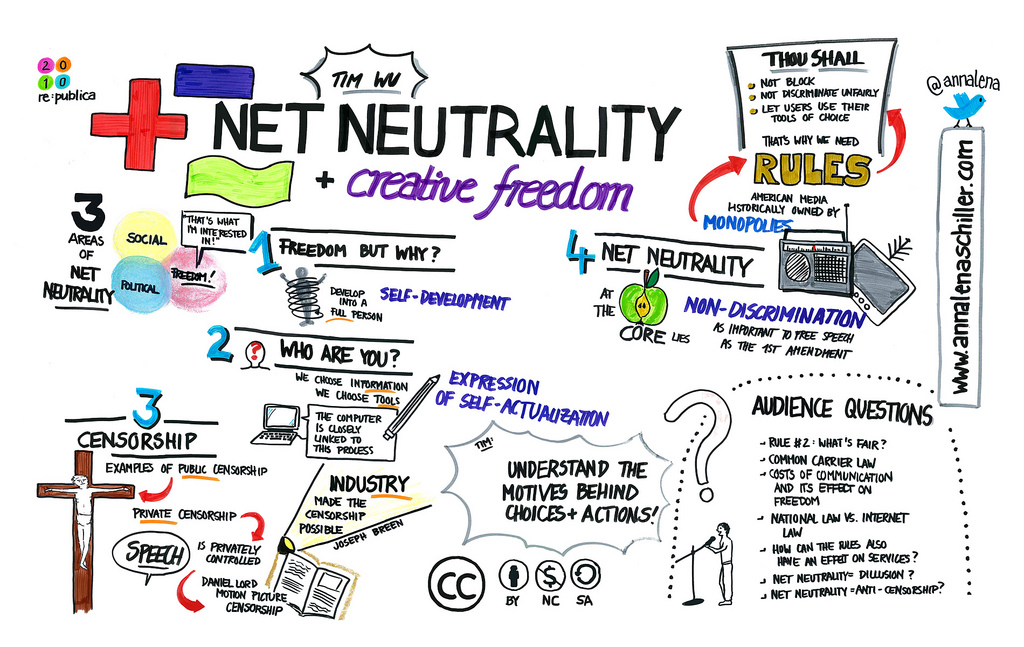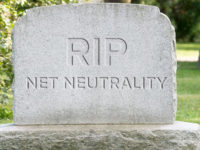Telus was not a charter member of the Bell website blocking coalition, but there was never much doubt that the last of the big incumbents would side with the application. Most of the independent and smaller telecom companies have opposed the proposal (and even the Canadian Wireless Telecommunications Association cannot bring itself to state that it supports the plan), but Canada is not known for competition among the big incumbents and this issue was no different. Indeed, the Telus submission supports the application, but relies on remarkably weak and somewhat head-scratching analysis to arrive at its conclusion that the proposal meets the necessary legal standards.

Net Neutrality And Creative Freedom (Tim Wu at re:publica 2010) by Anna Lena Schiller (CC BY-NC-ND 2.0) https://flic.kr/p/7VfazT
Net Neutrality
The Case Against the Bell Coalition’s Website Blocking Plan, Part 9: Why it Violates Canadian Net Neutrality Rules
Of all the claims that accompanied the launch of the Bell coalition’s website blocking plan – piracy rates (weak evidence) and claims of harm (unsupported by the data), inferences that the absence of a court order is commonplace (it isn’t), that the blocking will be strictly limited (unlikely), and that site blocking is effective (considerable data says otherwise) – the most audacious is surely the repeated assurances that site blocking does not raise net neutrality issues. Given that the starting principle for net neutrality is the right for users to access content and applications of their choice, blocking content is prima facie a net neutrality violation.
Thousands Slam Bell Coalition’s Website Blocking Proposal in Submissions to the CRTC
If the Bell coalition’s website blocking proposal was designed to garner attention, it achieved its goal as the proposal attracted thousands of individual submissions to the CRTC within days of it being posted online. The massive response is overwhelmingly negative, however, with thousands of Canadians registering their objections to the proposal. I wrote about the site blocking plan in a Globe and Mail op-ed and discussed it in an interview with CBC’s As It Happens. I will have many more posts on why the radical proposal should be rejected in the days ahead.
Canada’s SOPA Moment: Why the CRTC Should Reject the Bell Coalition’s Dangerous Internet Blocking Plan
Six years ago, then Public Safety Minister Vic Toews was challenged over his plans to introduce online surveillance legislation that experts feared would have significant harmful effects on privacy and the Internet. Mr. Toews infamously responded that critics “could either stand with us or with the child pornographers.” The bill and Mr. Toews’ comments sparked an immediate backlash, prompting the government to shelve the legislation less than two weeks after it was first introduced.
This week, telecom giant Bell led a coalition of companies and associations called FairPlay Canada in seeking support for a wide-ranging website blocking plan that could have similarly harmful effects on the Internet, representing a set-back for privacy, freedom of expression, and net neutrality. My Globe and Mail op-ed notes the coalition’s position echoes Mr. Toews, amounting to a challenge to the government and the Canadian Radio-television and Telecommunications Commission (the regulator that will consider the plan) that they can either stand with them or with the pirates.
Looking Back at 2017: My Top Ten Posts
With 2018 nearly upon us, many sites are taking a moment to reflect back on the past year and the posts and issues that attracted the most attention. On my site, the top issues are easy to spot: net neutrality, privacy, copyright, website blocking and Netflix issues dominate the top ten. My top ten new posts published in 2017:










